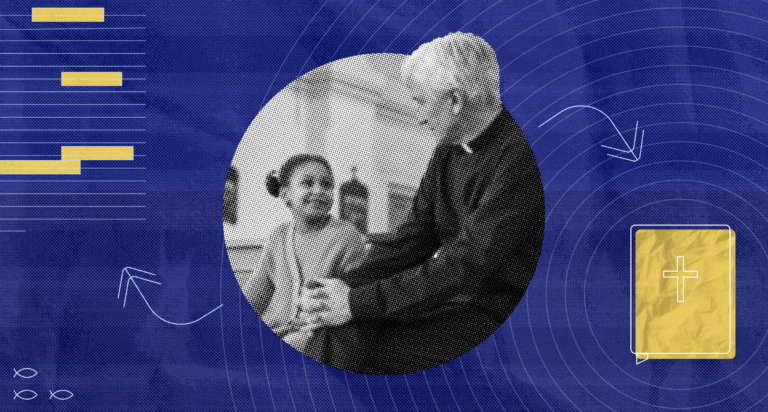In any flock of sheep, some are assertive and move forward, some hang toward the back, and others manage somehow or another to drift off on their own, stragglers and wanderers. These kinds of groups are also found in nearly every local church—and it’s the wanderers that we will now consider: those who, if ever they were holding fast to the Gospel, seem to be slowly, imperceptibly loosening their grip. James, the brother of Jesus, abruptly ends his epistle with a warning and an offer of hope for such people: “My brothers, if anyone among you wanders from the truth and someone brings him back, let him know that whoever brings back a sinner from his wandering will save his soul from death and will cover a multitude of sins” (James 5:19–20). In other words, if we ask the question of Cain back in Genesis 4:9, “Am I my brother’s keeper?” the answer is unequivocal: Yes! As members of the Lord’s spiritual family, we are responsible for one another, not simply to pray for one another but also to watch out for each other’s well-being. We therefore ought to have a particular concern for those who have professed the faith but have begun to drift away from Jesus Christ. We might imagine men and women wandering away from many things—relationships, church involvement, areas of service, etc. But James is concerned specifically about the one who “wanders from the truth.” And “the truth” here is not an abstract commodity; it is the truth found in the Scriptures and embodied in the Lord Jesus Christ (John 14:6). Wandering like this usually begins doctrinally (“I no longer like to think of God like that”) and continues morally (“Did God really say…” or “Does He really care if…”). We first wander in our minds, and then we wander in our actions. We assume that God is not actually so concerned about this or that sin, that we should do this wrong or neglect that right—and suddenly we find that those things come to us with no burden on the conscience. When this wandering happens, it happens individually. Every sin in our lives is an inside job: “Each person is tempted when he is lured and enticed by his own desire” (James 1:14). No matter how much we may want to blame it on our heritage, on the people around us, or on the influence of those with whom we spend time, we bear the responsibility for our own wandering. It also happens gradually. Few people experience some dramatic slide in sudden immortality. Rather, they begin to cultivate a sort of casual indifference to the path of righteousness, which then grows into disinclination to be on the path, then finally becomes a desire to step out of the path entirely and walk on another. And it happens willfully. When we wander from the truth of God’s Word, it is because we have chosen to turn away from it. Every time we neglect prayer, we neglect an open line of communication with our Creator. That we don’t read our Bibles, that we don’t engage in fellowship with God’s people, that we’ve ceased to tell others about Jesus—all of these things are choices that contribute to and demonstrate our wandering from the truth. The position of the wanderer is dire indeed. Yet when people wander, James says, the believer has a responsibility not to abandon them to their sinful choices but to endeavor to bring them back. And, importantly, James doesn’t designate the responsible party with specificity: “If … someone brings him back…” This mutual care is not a task limited to pastors or elders. It is every believer’s duty. When we say that Christians should watch out for one another, we don’t mean in the way that the KGB watched for dissenters who were hiding, sneaking, and undermining. Rather, we should speak the truth in love (Eph. 4:15), recognizing our own tendencies to wander, so that we “have mercy on those who doubt” (Jude 22). Charles Spurgeon said, I have known a person who has erred hunted down like a wolf. He was wrong to some degree, but that wrong has been aggravated and dwelt upon till the man has been worried into defiance; the fault has been exaggerated into a double wrong by ferocious attacks upon it. The manhood of the man has taken sides with his error because he has been so severely handled. That won’t do. If God leads us to repentance by means of His kindness (Rom. 2:4), what possible justification could we have for the cruel condemnation of a straying brother or sister? This kind of watching has a self-purifying dimension to it, because it confronts us with the call to radical obedience. We dare not go to somebody to point out a splinter in their eye before we’ve addressed the two-by-four in our own (Matt. 7:3; Luke 6:41). We must watch our own life and doctrine closely (1 Tim. 4:16). Indeed, as Paul says, there is a special danger to us when we reach out to the straying: “If anyone is caught in any transgression, you who are spiritual should restore him in a spirit of gentleness. Keep watch on yourself, lest you too be tempted.” (Gal. 6:1). Taking hold of the wanderer will have a profound impact: “Whoever brings back a sinner from his wandering will save his soul from death and will cover a multitude of sins.” Wandering from God’s truth and an assurance of God’s consistent companionship do not go hand in hand. It is a dangerous thing to walk in deliberate sin while comforting ourselves with the thought of security in Christ: “Oh, this doesn’t matter, because I’m secure in Christ.” That’s why Paul reminds his readers in 2 Timothy 2:19, “‘The Lord knows those who are his,’ and, ‘Let everyone who names the name of the Lord depart from iniquity.’” There is no doubt that the Lord knows and keeps His own—yet the evidence that we are His is found in our joyful obedience, our departing from iniquity. If we find ourselves wandering, we ought to feel no assurance until we have turned back to the Good Shepherd. Yet while the danger is daunting, the promise is encouraging: When somebody is restored, they are saved from death, and God covers the multitude of their sins. God is ready and willing to cover over the faults of the penitent. In the books of heaven, credited to the name of those who are in Christ is all of His righteousness—everything paid up in full, everything dealt with absolutely as God purposed. When the wandering backslider is prepared to return to Christ, that is no time for a lecture. It’s time to “kill the fatted calf” (Luke 15:17–24). It’s time for a party. It’s time for us to get up on our feet and to dance. A brother or sister has shown signs of life when we feared the worst; they were lost and have been found (Luke 15:32). The stakes in spiritual life are always high, the matter one of eternal life and death. To be outside of Christ is to be on the path to condemnation. So when men and women drift away, they absolutely need a word of warning and of welcome: “Come back to Christ. Today. Tomorrow. Forever.” This article was adapted from the sermon “True Living” by Alistair Begg.
Wandering from the Truth
We first wander in our minds, and then we wander in our actions.
Restoring the Wanderers
The Impact of Restoration
Wandering from God’s truth and an assurance of God’s consistent companionship do not go hand in hand.

Copyright © 2025 , Truth For Life. All rights reserved.
Unless otherwise indicated, all Scripture quotations are taken from The ESV® Bible (The Holy Bible, English Standard Version®), copyright © 2001 by Crossway, a publishing ministry of Good News Publishers. Used by permission. All rights reserved.











 English (US) ·
English (US) ·